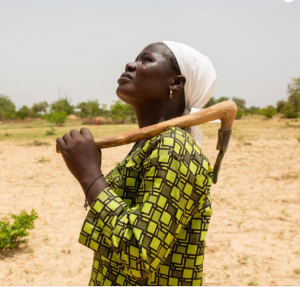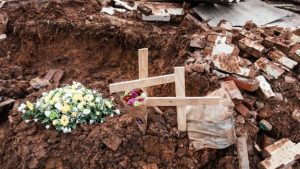Nerys writes: I wonder how many billionaires you are able to name? If you read the papers or watch television, or if you’re on social media, I would imagine that it might be quite a list. Our society is obsessed by the lives of the super rich, their relationships, their latest acquisitions, what they wear, the glitz and glamour, the never-ending scandals …
Now, what if I asked you for the names of any of the people killed in the flooding in Pakistan at the beginning of this month? Or what about the names of any of those threatened by starvation as crops fail year after year in parts of southern Africa, or those who lost their homes in Madagascar two years in succession from hurricanes super charged by warming oceans?
In our Gospel today, Luke 16. 19-31, it is the poor man, not the rich man, who is given a name by Jesus. I wonder why that is.
Earlier in the chapter, Jesus’s teaching about wealth had been ridiculed by some Pharisees. These money-loving religious leaders believed that being rich was a sign of God’s favour and that being poor was the result of sinfulness. They mock him for saying that you can’t serve God and wealth at the same time so he responds by telling his version of a popular folktale about a rich man and a poor man who are neighbours but who belong to two very different worlds.
We are introduced first to the rich man, clothed in purple and fine linen, hugely expensive robes costing many times the value of a working man’s annual wage. He feasted in luxury every day on exotic and costly dishes, in a country where ordinary people were lucky if they ate meat once a week. We also gather that he lived in a gated house guarded by dogs. It was at that gate that Lazarus lay every day, helpless and hungry, dreaming about the scraps from the rich man’s table, covered in sores with only the dogs to comfort him.
And then they both die and their roles are reversed. Now Lazarus is the one in glory, looking down from heaven, and the rich man is the one in torment, looking up, begging. At this point it becomes clear that this is more than a moral tale about riches and poverty. Jesus isn’t condemning the man simply for being rich, but for being selfish in his use of his wealth. At this point in the story, it becomes clear that this man knew Lazarus by name. He couldn’t use ignorance of the plight of his neighbour as a defence for not coming to his aid. He had been aware of Lazarus’ suffering but had chosen to do nothing to alleviate it.
At this point in the story also, it becomes clear that the rich man knew how he should have responded. He claims Abraham as his father. He must then have been familiar with the Scriptures. He would have known the Law of Moses which teaches compassion for the needy, and the Prophets who ceaselessly spoke out against the exploitation of the poor. The rich man knew the right thing to do but he chose not to do it. It’s no wonder that in death there was a great chasm between him and heaven. In life, he had cut himself off from others by his love of wealth and luxury, and by doing so he had cut himself off from God too.
A grim warning to the Pharisees who were behaving in a similar way towards the sick and poor in their communities. They were very quick to accuse Jesus of breaking God’s law but their love of money was leading them to disobey those parts of it which speaks of helping the poor, sharing our possessions with those in need and graciously providing a welcome to all. By giving Lazarus a name, Jesus was reminding them that every poor person is a unique individual who should matter to us. By not giving the rich man a name, Jesus was warning them that the man could be any of them who was doing as he did.
Although we don’t know the names of our neighbours who are worst affected by climate crisis, we are aware of happening to them and why. Images of their suffering appear daily on our screens and in our newspapers. We are also aware of what God is calling us to do in response. Our Old Testament reading for today, Amos 6.1a, 4-7, contains savage words from the prophet against the idle rich who profit from a system skewed in their favour, and in the Epistle, 1 Timothy 6.6-19, there are words of warning and encouragement.
We may not be rich in our own eyes but, compared with these people, we’re well off. They would be glad to change places with us, and we would be horrified to share their lives, even for a day. Like Luke’s Jesus, the writer of the letter to Timothy doesn’t urge us to give up all our money and possessions but to approach them as a gift entrusted to us by God who cares for all his children and expects us to do so too.
The rich man could easily have lifted Lazarus from destitution, restoring his dignity and health but he chose not to do so. We and our governments have a choice to heed the cries of the poor or to ignore them. As an introduction to your time of prayer this morning, I invite you to read the stories of two of our neighbours whose lives have been devastated by the effects of climate change and as you reflect on them, to allow God to disturb and discomfort you.

Patouma is a farmer in southern Malawi. Until recently, she has relied on growing maize on a one-acre plot of land to feed her family but climate change is now making this very difficult. ‘In a good year, when the rains are good, I can sometimes harvest up to 15 bags of maize. Last year, I planted my crops as usual but due to the drastic change of climate and very little rain, I only managed to harvest one bag. That only lasted one month. My family and I had never before been as hungry as we were then’.
Nonhlanhla who lived in the north of Durban in South Africa, was a bright girl, who was studying at the university. As she couldn’t afford the residence fees, she stayed in a shack which she and her brother built on the banks of a river. In Africa extreme weather events are becoming more frequent and more extreme as a result of climate change. Just before Easter 2019, Durban was hit by the heaviest rains recorded in 60 years. A year’s worth of rain fell in two days resulting in catastrophic flooding. Nonhlanhla’s home was washed away. She drowned in a wall of mud.

For more stories of individuals in different parts of the world affected by extreme weather due to Climate Change click on http://www.wateraid.org/uk/stories/climate-stories which will take you to the website of Water Aid, the charity we are supporting in our Harvest Appeal this year.






